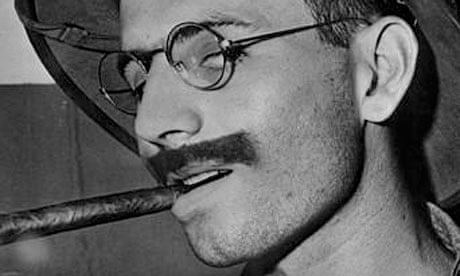Arthur Marx, who has died aged 89, grew up in the shadow of his father, Groucho, and was steeped in the controlled chaos of the Marx Brothers. Torn between trying to distance himself from a demanding father, yet also prove worthy of his genius, he enjoyed a long career as a writer of screen and stage comedies, novels and biographies. Not surprisingly, however, his most successful work capitalised on the public's interest in his father and his uncles, Chico, Harpo, Gummo and Zeppo.
Marx wrote several works about Groucho, the first of which, Life With Groucho (1954), published at the height of his father's television popularity, was a warts-and-all portrait punctuated by Groucho's own annotations. (Marx wrote that he would like to correct the impression that his father was a miser; Groucho's footnote read: "You'd better or I'll cut you off without a nickel.") When excerpts that Groucho had not seen were published in the Saturday Evening Post, he threatened to sue his son. Marx sent his father a dummy set of altered proofs and published the book as it was originally written.
In 1970, Marx and Robert Fisher wrote the musical Minnie's Boys, which opened on Broadway with Shelley Winters in the titular role as his grandmother, who started her sons in vaudeville. Marx published a second memoir, Son of Groucho, in 1972. After his father's death in 1977, he and Fisher wrote a TV biopic, Groucho (1982), starring Gabe Kaplan, and a play, Groucho: A Life in Revue (1986), which became a hit off-Broadway and was nominated for three Olivier awards in London, including best comedy performance of the year (for Frank Ferrante, in the lead role). The play became a TV movie in 2001. Marx also wrote the book My Life With Groucho: A Son's Eye View (1988) and trawled through the family albums in Arthur Marx's Groucho: A Photographic Journey (1998).
Arthur Julius Marx was born in New York, the elder of Groucho's two children with his first wife, Ruth Johnson. He was named after his uncle Arthur (who performed as Harpo). Julius was Groucho's own given name.
He spent much of his childhood on the vaudeville circuit with the family act, but when he was 10 they settled in Hollywood, where the Marx Brothers' burgeoning film careers rendered touring unnecessary. Arthur found his own success in tennis, becoming a top-ranked player, good enough to compete on a junior Davis Cup team with Jack Kramer in 1939. He joined the amateur tennis circuit and the highlight of his career came at the Cincinnati Masters, where he lost an epic five-set final to Bobby Riggs. Although he found it annoying that "when you'd win a big tournament the papers would say 'son of Groucho beats Jack Kramer'" he acknowledged that "you have to appreciate it too because you get a lot of advantages from it".
After serving in the coast guard in the Philippines during the second world war, Marx returned to Hollywood. He worked in advertising, wrote gags for Milton Berle and then joined MGM as a script reader, despite his father discouraging him from going into the movies "because it's a rotten business". He soon moved into scriptwriting, supplying uncredited material for many films, including the Blondie series, based on the popular comic strip. He was credited for co-writing the screenplay of Blondie in the Dough (1947). He also wrote for Pete Smith's popular comedy short films.
His first novel, The Ordeal of Willie Brown (1951), concerned a tennis bum. Not As a Crocodile (1958) was a collection of comic pieces about the family he was raising with his first wife, Irene, and provided an entry into television when he and the former Marx Brothers writer Mannie Manheim adapted it for the series General Electric Theatre, with David Wayne starring. The pair wrote an episode of a TV series based on the US comic strip Dennis the Menace before Marx began his long-running partnership with Fisher, who had written gags for his father.
Arthur and Fisher collaborated on A Global Affair (1964), the first of four films they wrote for Bob Hope, and the play The Impossible Years (1965) a comedy that was a huge hit on Broadway for the actor Alan King. They wrote for a host of popular TV shows, particularly McHale's Navy, Petticoat Junction, All in the Family and Maude, as well as less popular ones including The Mothers-in-Law and variety programmes such as The Paul Lynde Show. They then became story editors and writers for Alice, the long-running series based on Martin Scorsese's film Alice Doesn't Live Here Anymore (1974).
Marx began another career as a show-business biographer outside the family, with a 1974 book about Dean Martin and Jerry Lewis entitled Everybody Loves Somebody Sometime (Especially Himself). His other subjects included the movie mogul Samuel Goldwyn and the comedians Red Skelton, Mickey Rooney and Hope. In 1993 he published Set to Kill, a mystery novel set – like his first book – in the world of tennis.
His marriage to Irene ended in divorce. Marx is survived by his second wife, Lois; his sons, Steve and Andy; a stepdaughter, Linda; his sisters, Miriam and Melinda; and four grandchildren.
